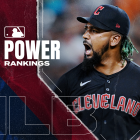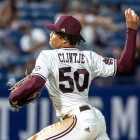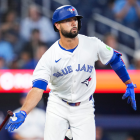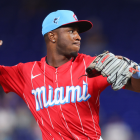Baseball's offseason has its fair share of deadlines, many of which are boring and procedural in nature. One such deadline passed Friday afternoon at 1 p.m. ET -- that's when teams and arbitration-eligible players had to agree to contracts for their upcoming season or otherwise file their numbers in preparation for an arbitration hearing.
For those unfamiliar with the arbitration process, it concerns players who have between three and six years of major league service time. (There's also a group of players with more than two years but less than three years who are arbitration eligible, these qualify for what's called "Super Two" status.) Arbitration-eligible players have the option of presenting their case to an unbiased panel, who then decide if the player's offer is more fair than the team's. Exciting stuff, right?
These days, nearly every team follows the "trial-and-file" philosophy -- meaning, in so many words, that if the parties file numbers then they'll attend the hearing. Those hearings -- during which a team has to tear down one of its players -- can devastate the player-team relationship. As such, it's in both parties' best interest to avoid the hearings whenever possible.
Many of those eligible for arbitration did indeed reach agreements on Friday. Let's roll through the things you need to know.
Arenado to break record
Colorado Rockies third baseman Nolan Arenado hasn't yet agreed to terms on a new deal. When he does, however, he's going to set a new high mark for the highest salary awarded to an arbitration-eligible player:
There is a strong sense that Nolan Arenado will not go to an arbitration trial with the Colorado Rockies, league sources tell ESPN. Arenado requested $30 million. The Rockies offered $24 million. Wherever he does settle -- and it's very likely -- it'll be a single-season record.
— Jeff Passan (@JeffPassan) January 11, 2019
Arenado is in the final year of his arbitration eligibility, meaning this time next year he'll hit the open market.
Josh Donaldson's currently possesses the record for the highest arbitration salary, at $23 million.
Betts gets $20 million
Mookie Betts is one of the best players in baseball, and on Friday he agreed to a deal that will pay him $20 million for the upcoming season -- the most of any pact signed on Friday.
Of course, Betts's actual market value is greater than $20 million. If if he were on the open market, he'd be in line for at least $30 million per season. Still, this is more representative of his true value than the $10.5 million he received last year. That nearly $10 million jump, by the way, represents the biggest arbitration raise ever received by a position player.
It's worth noting Betts has one more year of arbitration eligibility remaining. If Betts stays healthy, he could break whatever mark Arenado sets.
deGrom sets record
Betts may own the largest year-to-year arbitration raise ever received by a position player, but the overall honor belongs to Jacob deGrom.
deGrom signed for $17 million on Friday, a $9.6 million raise from last season, when he made $7.4 million. Like Betts, deGrom has one more round of arbitration eligibility remaining. David Price, at $19.75, possesses the highest arbitration salary for a pitcher in history. deGrom stands a good chance of topping that.
The Mets also agreed to terms with Noah Syndergaard ($6 million) and Zack Wheeler (about the same).
Davis, Bryant, others join eight-figure club
A few other players broke the eight-figure mark in addition to Betts and deGrom, including Oakland Athletics slugger Khris Davis and Chicago Cubs third baseman Kris Bryant. It was a lucrative day for anyone named "Chris" or a variation thereof.
Davis, who will be a free agent following the upcoming season, will bank $16.5 million in the interim. That's a hefty figure for the Athletics, who entered 2018 with a payroll around $66 million. Davis has earned that cash by becoming one of the top home-run hitters in the game. He's homered at least 40 times in three consecutive seasons, including a career-best 48 last year.
Bryant, meanwhile, is coming off a disappointing season by his lofty standards. All the same, he'll make $12.9 million in 2019. He has two more years of arbitration eligibility remaining, so expect him to break the $20-million mark sooner than later.
Washington Nationals third baseman Anthony Rendon ($18.8 million), Chicago White Sox slugger Jose Abreu ($16 million), St. Louis Cardinals outfielder Marcell Ozuna ($12.25 million), Red Sox shortstop Xander Bogaerts ($12 million), Cleveland Indians shortstop Francisco Lindor ($10.55 million), and Cincinnati Reds pitcher Tanner Roark ($10 million) also broke the $10-million threshold.
Cole, Bauer,young starters among notables who didn't sign
Most players agreed to terms on Friday -- not all though.
The Houston Astros failed to reach an agreement with Gerrit Cole, meaning he'll head to arbitration in what is his last winter of eligibility. Cole has been projected to earn around $13 million. Cleveland couldn't reach an agreement with Cole's old UCLA teammate Trevor Bauer, either. Bauer is projected to earn more than $11.5 million.
Luis Severino (New York Yankees) and Aaron Nola (Philadelphia Phillies) also saw the deadline come and go without reaching terms. Severino is projected to make $5 million as a Super Two player, while Nola will check in closer to $7 million should the model prove correct.
Blake Treinen, Oakland's stud closer, didn't come to terms. He was projected to make around $6 million.


















